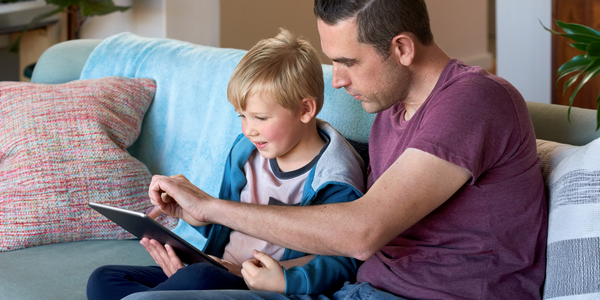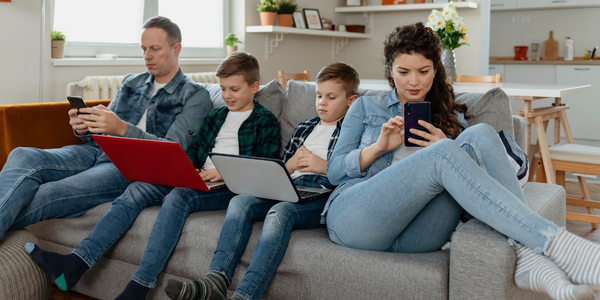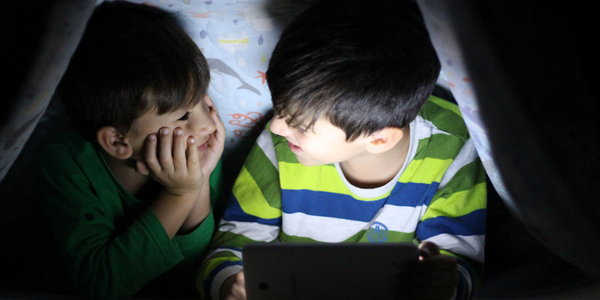What has surprised you as a parent? In my 18 years of parenting, a few blind spots have caught me off guard, particularly in the areas of technology, sexual purity, discipline, and raising successful kids.
Why do I call them blind spots? Because these are issues that I couldn’t see clearly as I traveled the roads of parenting. I needed the wisdom of godly parents who had gone before me to point out my blind spots.
Today begins a podcast and blog series, “Blind Spots in Parenting.” As always, we rely on the Bible and trusted resources. Melanie and I share what we’ve learned along the way. We are praying that you will be better equipped to parent now, in the teens years, and beyond.
Because we see this as a vital topic, we are beginning with technology. What does the Bible say? What are expects in the field seeing? What have we learned…sometimes the hard way?

What Does the Bible Say about Technology?
In a book written 1000’s of year prior to the iPhone one may think that the Bible is absent of current parenting struggles like technology use. But that is what makes the Bible so amazing! God has guidance and wisdom on every subject we could ever need.
Matthew 6:22-23 The eye is the lamp of the body. If your eyes are healthy, your whole body will be full of light. But if your eyes are unhealthy, your whole body will be full of darkness. If then the light within you is darkness, how great is that darkness!
These two verses are part of Jesus’ famous Sermon on the Mount. In little nuggets of truth about various aspects of life, He is teaching people how to live. Our intake of technology through our eyes and ears directly impacts our hearts.
Proverbs 4:23 – Above all else, guard your heart, for everything you do flows from it.
Have you ever heard the statement “Garbage in, garbage out”? As believers we need to be particularly thoughtful about what we are taking in. We want hearts shaped by good things that cause us to bless, encourage, and lift up another.
While this is a great reminder for us as adults, our children lack the maturity to discern what they should and shouldn’t view. We must be the gatekeepers for our kiddos.

What do Professionals Say about Technology?
Here are the guidelines I shared in How Much Media Use is the Right Amount? by the American Pediatric Association:
- Younger than 18 months: Avoid use of screen media other than video-chatting.
- 18 to 24 months: Choose high-quality programming and watch it with your children to help them understand what they’re seeing.
- 2 to 5 years: Limit screen use [TV and computer] to 1 hour per day of high-quality programs. Parents should co-view media with children to help them understand what they are seeing and apply it to the world around them.
University of Calgary psychologist Sheri Madigan, PhD, found a correlation between the amount of time per week spent on screens at ages 24 months and 36 months, and poorer performance on screening tests for behavioral, cognitive and social development at 36 months.
Notice that children under than 18 months should avoid using screens except for when chatting through apps like Zoom or Facetime. This is because children need face-to-face interaction. This is what made COVID even harder for young children. Then, even when screen time is allowed for young ones, the suggestion is that the parent or caregiver watches the programming with the child to discuss what they are viewing. For maximum growth children need to play, talk, and be with people, not electronics.
In Part 2 of this Technology series, I will share the shocking statistics of pornography on the human brain.

How to Avoid the Blind Spots of Technology?
Model
Another common phrase is “monkey see, monkey do.” If we want our children to make wise technology choices, we must model it for them. Our children must see us not just as law tellers, but law keepers.
Train
With that said, we don’t want to raise Pharisees (legalists pointing out other’s sins) or hypocrites (living one way in public, but the opposite when others aren’t looking). We want to train our children to understand in their hearts the “why” of wise technology use.
Here are some questions you can use to talk about technology with your kids:
- Is what we are watching or listening to bringing us closer to God?
- Is what we are watching or listening to noble, right, pure, praiseworthy (Philippians 4:8)?
- Do you have accountability when on this device?
We can’t get away from technology, but we can get creative to help our kids navigate it well. I saw a friend handle this beautifully when we were eating with our kids at a restaurant. A commercial came on one of the nearby tv’s that she deemed inappropriate for her children’s young eyes. As soon as she said “hide your eyes,” her kids covered their eyes! But the training for this had to occur at home. As your children grow, the baton is passed for them to “hide their eyes” on their own accord. This goes back to teaching our children self-control.

Technology Expectations in Our Homes
In this week’s Parenting to Impress podcast Melanie and I share the expectations we have in our homes. We discuss using a TV as background noise, using DVDs for travel, and screens in the bedroom. Then we hit the very popular topic of using screens at restaurants and grocery stores, and the importance of accountability. I invite you to listen below or on your favorite podcasting app to join in the conversation.
